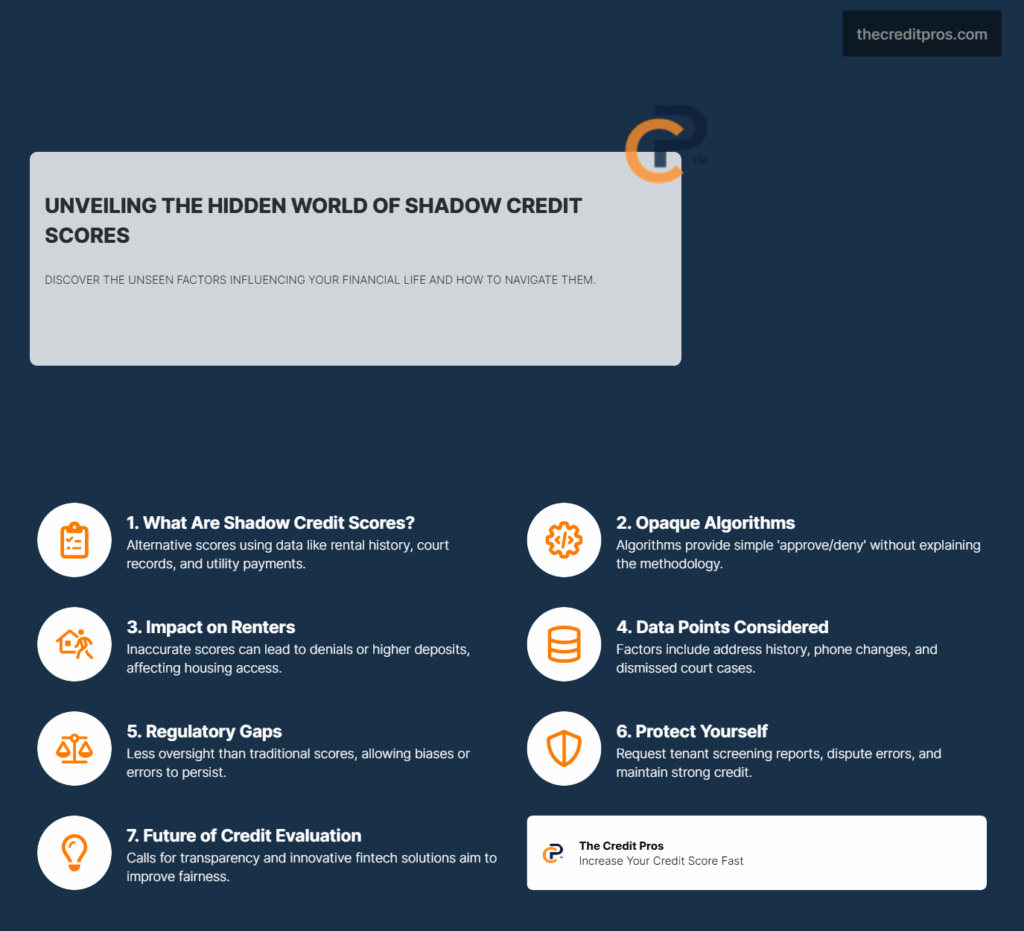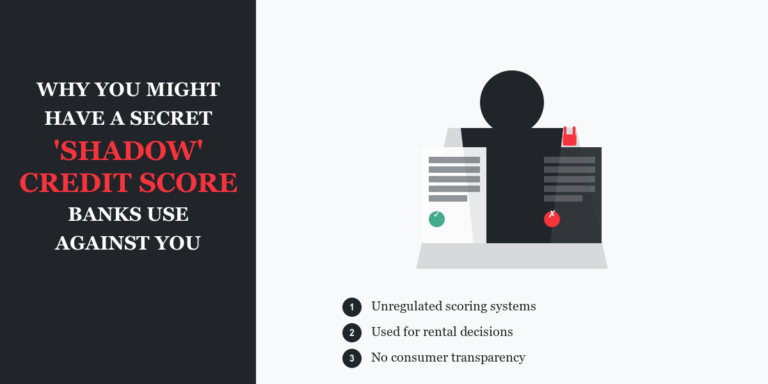Table of Contents
You might think your FICO score is the only number that matters when applying for loans or housing, but financial institutions are increasingly using hidden evaluation metrics that you can’t easily access or dispute. These “shadow credit scores” operate largely outside traditional consumer protection frameworks, analyzing everything from your rental history to court records—often without your knowledge. When Kim Fuller kept getting denied for apartments despite her decent credit, she discovered her applications were being rejected based on a tenant screening report that contained errors she couldn’t correct.
Behind these shadow systems lies a complex web of data collection companies that compile information beyond what appears in your traditional credit report. Unlike standard credit scores that you can check for free annually, a shadow credit score may provide property managers and lenders with simple “approve/deny” recommendations without explaining their methodology. Understanding how these hidden scores work is the first step toward protecting yourself in a financial system that increasingly relies on algorithms to determine who gets approved and who gets left behind.
Understanding Shadow Credit Scoring Systems: Beyond FICO and Equifax
Shadow credit scoring systems operate in parallel to traditional credit reporting but with far less transparency and regulation. Unlike conventional FICO scores that evaluate payment history, credit utilization, and account age, shadow credit score systems incorporate a much broader range of data points that consumers often don’t realize are being collected or analyzed. These alternative evaluation metrics have evolved rapidly with advances in data analytics and artificial intelligence, allowing companies to make increasingly nuanced judgments about consumer reliability without the constraints that govern traditional credit bureaus.
Tenant screening companies represent one of the most common applications of the shadow credit score. These firms compile extensive dossiers on potential renters by aggregating information from court records, prior rental histories, eviction filings (even those that were dismissed or withdrawn), and sometimes even criminal background checks. Companies like RentGrow, On-Site, and LeasingDesk have built proprietary algorithms that analyze this data and generate risk assessments that landlords use to evaluate applicants. What makes these systems particularly concerning is their opacity—consumers rarely see the full reports or understand how different factors are weighted in the final recommendation.
The algorithms powering these shadow systems often assign numerical values to various aspects of a person’s history, creating what amounts to an alternative credit score. For example, RealPage, a leading property management technology firm, uses what it describes as artificial intelligence to “identify high-risk renters with greater accuracy” by analyzing its database of 30 million lease outcomes. The company claims this model saves property managers an average of $31 per apartment annually, but the methodology behind these calculations remains hidden from the consumers who are being evaluated.
The Real-World Impact: How Shadow Scores Affect Your Financial Life
The consequences of shadow credit score extend far beyond simple approval or denial for housing. These hidden evaluation systems create ripple effects throughout consumers’ financial lives, often in ways they don’t immediately recognize. When Kim Fuller applied for an apartment in Baltimore, she was confident her fair credit score of 632 would qualify her. After being denied without explanation and subsequently raising her credit score to 663, she was still rejected. It was only after persistent questioning that she discovered her application had been screened by RentGrow, which had flagged her “credit history” as problematic—though no further details were provided.
Shadow credit scores don’t just determine whether you get approved—they also influence the terms you’re offered. Many renters who responded to ProPublica’s survey reported being asked to pay double or triple security deposits because of low tenant scores, despite having acceptable traditional credit profiles. This practice effectively prices many people out of housing opportunities even when they haven’t been explicitly denied. Chloe Crawford, an artist attending Rutgers University, discovered upon arrival at her new apartment that her landlord wanted an extra month’s rent as a deposit because of her low tenant screening score, despite her very good credit score of 788. The additional $1,000 deposit requirement would have significantly impacted her budget for groceries and car repairs.
The decision-making process behind these evaluations remains largely hidden from consumers. Unlike with traditional credit scores, where specific factors like missed payments or high credit utilization are identified, shadow credit score systems often provide only a simple “approved” or “denied” recommendation to landlords or lenders. This lack of transparency makes it nearly impossible for consumers to understand how to improve their standing. Some tenant screening reports have flagged seemingly innocuous details like “too many different phone numbers reported” as risk factors, leaving applicants confused about how such information relates to their reliability as tenants.
“You don’t know why you got denied or if you were ever considered. It’s really murky out there.” – Kim Fuller, a mental health services coordinator who experienced multiple rental application denials despite having a fair credit score
- Common shadow credit score factors that may surprise consumers:
- Number of addresses in the past five years
- Frequency of phone number changes
- Court records, including dismissed cases
- Rental payment history not reported to credit bureaus
- Previous landlord disputes, even when resolved
- Medical debt collections, even when paid
- Utility payment patterns
- Employment stability and income verification
The Regulatory Gap: Why Shadow Scores Receive Less Oversight
Shadow credit scoring systems operate in a regulatory environment with significantly fewer constraints than traditional credit reporting. While the Fair Credit Reporting Act (FCRA) technically covers tenant screening and other background checks, the practical application of these protections has proven inadequate. The major credit bureaus—Equifax, Experian, and TransUnion—stopped reporting evictions in 2017 after facing lawsuits and reaching settlements regarding persistent mistakes in their reports. However, tenant screening companies, which often feed into a shadow credit score, continue to report evictions, including cases that were dismissed or ruled in the tenant’s favor.

Federal oversight of these alternative scoring systems is notably weaker than for conventional credit scores. The Consumer Financial Protection Bureau (CFPB) collects complaints about tenant screening services but lacks the authority to examine their algorithms unless conducting a formal investigation. Unlike with traditional credit scoring models, where federal financial regulators can review internal records of financial institutions to ensure that scoring methods are predictive, statistically sound, and nondiscriminatory, no parallel process exists for algorithms that contribute to a shadow credit score.
The lack of regulatory scrutiny has serious implications for consumers. As Chi Chi Wu, an attorney at the National Consumer Law Center, pointed out, “Nobody’s supervising. Nobody’s checking the data. Nobody’s checking these algorithms.” This regulatory vacuum allows shadow credit scoring systems to operate with minimal accountability, potentially perpetuating biases or inaccuracies that can have profound effects on consumers’ access to housing and financial services. The data industry association has defended screening practices, claiming they’re based on “race-neutral data” and remove subjectivity that could be a source of discriminatory behavior, but without independent oversight, these claims remain difficult to verify.
Protecting Yourself: Strategies to Navigate the Shadow Credit System
Taking proactive steps to understand and manage your shadow credit score is essential in today’s complex financial landscape. The first and most important action is to request your tenant screening reports from major companies in the industry. Under the Fair Credit Reporting Act, consumers have the right to access information collected about them, though tenant screening companies have often interpreted this requirement narrowly. Companies like RentGrow (owned by Yardi Systems), On-Site, TransUnion SmartMove, and LeasingDesk should provide copies of your reports upon request, helping you identify what contributes to your shadow credit score—though you may need to be persistent.
Identifying and disputing errors in reports that contribute to your shadow credit score requires diligence and documentation. Unlike traditional credit reports where the dispute process is standardized, challenging inaccuracies in tenant screening reports can be more complicated. Start by documenting any discrepancies you find, gathering evidence to support your position, and submitting formal disputes in writing. Keep copies of all correspondence and follow up regularly until the issue is resolved. Be aware that screening companies may direct you to the original source of the information, such as court records, rather than correcting their own files directly.
Maintaining strong traditional credit remains one of the best defenses against a negative shadow credit score assessment. While tenant screening companies look beyond conventional credit reports, a solid FICO score can still carry significant weight with landlords and lenders. Focus on paying bills on time, keeping credit card balances low, and addressing any collections accounts promptly. Additionally, be prepared to provide context for any negative factors that might appear on your reports. If you experienced financial hardship due to medical issues or job loss, having documentation and a clear explanation ready can sometimes help overcome concerns raised by screening algorithms.
“You’re fighting against the company that uses secret algorithms. Where do you even go with that?” – Carol Ott, Tenant Advocacy Director at the Fair Housing Action Center of Maryland
The Future of Consumer Credit Evaluation: Pushing for Transparency
The growing awareness of shadow credit scoring systems has sparked calls for reform from consumer advocates and legislators. In March 2021, Senator Elizabeth Warren and five other senators wrote to the CFPB expressing concern that screening companies need closer oversight, specifically noting that “effective oversight of these companies requires proactively investigating and auditing their effects on protected classes.” This pressure from lawmakers signals a potential shift toward greater scrutiny of these hidden evaluation metrics.
Industry practices are slowly evolving in response to criticism and legal challenges. Some tenant screening companies have begun providing more detailed information to consumers about the factors influencing their recommendations, though these disclosures often remain inadequate. As awareness grows, more consumers are beginning to understand how a shadow credit score can affect their financial opportunities, pushing for greater transparency and fairness. Legal challenges to screening practices that disproportionately impact protected groups could also drive changes in how these algorithms are designed and implemented.
Technology itself may eventually offer solutions to the problems it has created. Newer fintech companies are exploring alternative credit evaluation methods that are both more transparent and potentially more accurate in predicting consumer behavior. Some of these approaches allow consumers to voluntarily share information about their financial habits, such as utility payments or rent history, to build positive credit profiles. These innovations could eventually provide a more balanced and comprehensive picture of financial responsibility than either traditional credit scores or the current shadow credit score systems, giving consumers more control over their financial identities.
Conclusion: Taking Control in a Shadow Credit World
Shadow credit scoring systems have fundamentally altered the financial landscape, operating with minimal transparency and oversight while profoundly impacting consumers’ access to housing, loans, and other necessities. Unlike traditional credit scores that consumers can monitor and improve, a shadow credit score remains largely hidden from view, analyzing everything from eviction filings to utility payment patterns without clear explanations of its methodology. The regulatory gap surrounding shadow credit score systems has created an environment where errors can persist unchallenged and potentially discriminatory practices may go undetected, leaving consumers like Kim Fuller struggling to understand why they’re being denied despite decent conventional credit scores.

As shadow credit score systems become increasingly prevalent, consumers must take proactive steps to protect themselves—requesting reports from tenant screening companies, documenting and disputing inaccuracies, and maintaining strong traditional credit scores as a counterbalance. The push for greater transparency and accountability in shadow credit score practices represents not just a consumer protection issue but a fundamental question about fairness in our financial system: in a world where algorithms increasingly determine who gets approved and who gets left behind, shouldn’t we all have the right to understand how we’re being judged?



